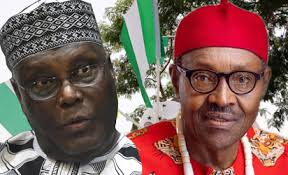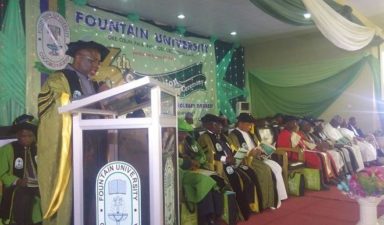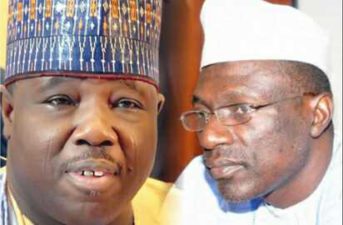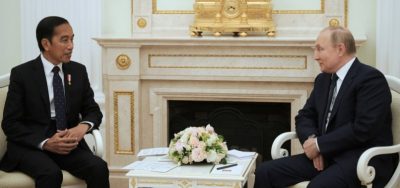*Say bank’s branches shutdown not only in Nigeria
*As HSBC has closed 321 offices in UK since 2015
By KEMI KASUMU
BBC business editor Robert Peston said that as big as the $1.9bn penalty looks, it could have been much worse. “HSBC has signed a Deferred Prosecution Agreement for breaches of the US Bank Secrecy Act, the Trading with the Enemy Act and assorted money laundering offences. This is in effect putting the bank on probation,” he said. “But if HSBC had been indicted for these offences, that would have meant that the US government and others could no longer have conducted business with it, which would have been humiliating and highly damaging.”
Barely 48 after the Peoples Democratic Party (PDP)’s President Candidate, Alhaji Atiku Abubakar, cried out over a purported global banking giants, HSBC and UBS, leaving Nigeria using same as tool for criticism against President Muhammadu Buhari’s government, facts from the archive have revealed why those who described the Atiku’s cry as empty are justified.
This revelation shows that HSBC, one of the two “global banking giants”, has been having record of being safe haven for looted money for a long time going by a BBC report of 11 December 2012.
According to the report, HSBC at that had issued a statement confirming that it had been charged to pay United States authorities $1.9 billion (1.2 billion Pound Sterling) over money laundering, the largest paid in such a case.
A US Senate investigation said the UK-based bank had been a conduit for “drug kingpins and rogue nations”.
Money laundering, according to the BBC report, is a process of disguising the proceeds of crime so that the money cannot be linked to the wrongdoing.
HSBC admitted having poor money laundering controls and apologized to the US parliament investigating.“
We accept responsibility for our past mistakes,” said HSBC group chief executive Stuart Gulliver in a statement.
To the chagrin of some Nigerian intellectuals, who read and listened to reports about Alhaji Atiku Abubakar’s case trying to make vacating the Nigeria’s economy space of this same HSBC and its colleague company, UBS, look like failure of his major challenger in the coming 2019 presidential elections, President Muhammadu Buhari, dug into the archives and pointed attention of The DEFENDER to this antecedents of HSBC particularly.
Some of these Nigerians are saying, with heaps of corruption allegation against Atiku, other talk in town of his yet to be explained inability to be able to enter the United States of America (USA) and an exposition by the Nigeria’s ruling All Progressives Congress (APC) that former President Olusegun Obasanjo, who suddenly recently began to support his former deputy that he had said God would never forgive him if he supported his presidential ambition, that the man considered to be the best candidate the Nigeria’s main opposition PDP can have should have confessed what connection he has with the HSBC indicted in America for being safe haven for looters’ money and other rogue countries rather than politicizing economic reality.
Only on Saturday November 3, 2018 barely six years after the HSBC’s indictment in America, Nigeria’s main opposition PDP’s Presidential Candidate, Atiku, in effort to position himself as better option to All Progressives Congress (APC)’s President Buhari in the coming presidential elections, made a loud complaint in favour of the “global banking giant” on the soil of Nigeria saying it was very sad that it and one other global banking giants were leaving Nigeria as a result of bad economy.
It will be recalled that enforcement of TSA and BVN has made business as usual difficult for any financial institution in Nigeria whose major source of early was corruption-based.
For this reason, many banks, known to have been complacent with allegedly keeping money for people in government instead of allowing money to circulate through agriculture and small and medium scale enterprises financing for the growth of the nation’s economy, started cutting their staff strength.
This, to the opposition party in the country, is the what is understood as failure of economy policy of a government, whose such policy driving anti-corruption war has restored Nigeria to its lost glory in the eyes of the world to the extent that every leader of the world now compete one after another either to invited President Buhari to his or her home country as special guest or visit him in Abuja, Nigeria’s capital with a view to registering their acknowledgment of his integrity based personality and national reform based government in the world’s most popular black nation.
But to Nigeria’s patriotic intellectuals, who have developed thick skin against advancements of the pro-looters’s #CorruptionFightBack struggle in the country, to expose anti-Buhari’s government attempts as they come has become a must-do project, hence the exposition of PDP’s Atiku Abubukar over his Saturday declaration of sympathy for HSBC and UBS trying to use it as basis to compromise the already globally acknowledged integrity and economic recovery moves in the country.
The Central Bank of Nigeria (CBN) had announced on Friday November 2, 2018 that Global banking giant, HSBC and UBS, a Swiss private bank, had closed their representative offices in Nigeria.
HSBC, it will be recalled, in collaboration with The Economist Magazine, in what was later exposed to be working for opposition to actualize the Third Force effort to unseat Buhari in 2019, was that “global banking giant” that predicted that if President Buhari won a second term, Nigeria economy would collapse.
But unknown to some Nigerian economic analyst who gave the prediction a hearing, in accepting its indictment as safe haven for drugs and rogue countries, the HSBC had told the US parliament, through the statement by Group Chief Executive Stuart Gulliver, that, “We accept responsibility for our past mistakes. We have said we are profoundly sorry for them, and we do so again.
The bank said it had spent $290m on improving its systems to prevent money laundering and clawed back some bonuses paid to senior executives in the past.
“It also said it expected to reach an agreement with the UK’s Financial Services Authority shortly. Last month it announced it had set aside $1.5bn to cover the costs of any settlement or fines. The news followed the announcement of a similar but much smaller settlement with UK-based Standard Chartered bank, which will pay $300m in fines for violating US sanctions.”
The BBC reported, adding that, “The cases are seen as part of a crackdown on money laundering and sanctions violations being led by federal government agencies and New York state authorities.”
Senate criticism
The settlement had been widely expected following a report by the US Senate, published earlier this year (2012), that was heavily critical of HSBC’s money laundering controls.
The report alleged that:
- HSBC in the US had not treated its Mexican affiliate as high risk, despite the country’s money laundering and drug trafficking challenges
- The Mexican bank had transported $7bn in US bank notes to HSBC in the US, more than any other Mexican bank, but had not considered that to be suspicious
- It had circumvented US safeguards designed to block transactions involving terrorists drug lords and rogue states, including allowing 25,000 transactions over seven years without disclosing their links to Iran
- Providing US dollars and banking services to some banks in Saudi Arabia despite their links to terrorist financing
- In less than four years it had cleared $290m in “obviously suspicious” US travellers’ cheques for a Japanese bank, benefiting Russians who claimed to be in the used car business
Speaking in July, Trade Minister and former HSBC boss Lord Green said there were failures of implementation
The report suggested HSBC accounts in Mexico and the US were being used by drug barons to launder money.
“The banks became very overextended, not just in lending on property, which we all know about, but in this case, for example, buying businesses in Mexico about which, it turned out, they knew too little,” Sir John Gieve, former deputy governor of the Bank of England told the BBC.
The Senate report also said HSBC regularly circumvented restrictions on dealings with Iran, North Korea, and other states subject to US sanctions.
BBC business editor Robert Peston said that as big as the $1.9bn penalty looks, it could have been much worse.
“HSBC has signed a Deferred Prosecution Agreement for breaches of the US Bank Secrecy Act, the Trading with the Enemy Act and assorted money laundering offences. This is in effect putting the bank on probation,” he said.
“But if HSBC had been indicted for these offences, that would have meant that the US government and others could no longer have conducted business with it, which would have been humiliating and highly damaging.”
HSBC closes a quarter of branches, as 1,000 banks shut for good
BBC’s Personal Finance reporter, Brian Milligan, stated on 4 December 2016 that “HSBC has closed more than a quarter of its UK branches over the last two years, as part of 1,000 bank closures in total, research by Which? has found.”
He continued: The consumer organisation says that HSBC closed 321 branches since January 2015, or 27% of its network.
The much smaller Co-operative Bank has closed more than half of its branches over the same period.
HSBC said most customers now bank via the internet or on smartphones.
However, Which? said that while 56% of adults used online banking last year, there are still 20 million adults who don’t – or can’t – use it.
Many of those have a poor broadband connection.
Indeed, the areas most affected by closures – South West England, Wales and Scotland – are predominantly rural and often with unreliable connectivity.
Lloyds has already announced that it plans to speed up its closure programme in 2017, closing about 200 branches.
New guidelines
HSBC said it would continue to review its branch network, to make sure it has a sustainable network for the future.
But it said far fewer people were going into branches.
“Overall footfall in our branches has fallen by over 40%, with 93% of contact with the bank now completed by telephone, internet or smartphone, plus 97% of cash withdrawals are made via an ATM,” said an HSBC spokesperson.
“When we do make the decision to close a branch, our main priority is to ensure that our customers and their banking needs are catered for in the best way possible.”
The British Bankers Association (BBA) is in the process of updating guidelines for branch closures.
Those guidelines will ensure that staff in affected banks are properly trained, and that communities are given fair warning when a branch is closing.
But Which? said banks could still do more to help customers faced with closures.
“Banks can and must do a better job of working with their customers to understand their needs and those of the local community, especially when they are making changes to the services they offer or closing branches,” said Peter Vicary-Smith, the chief executive of Which?
The figures used by Which? came from the banks themselves.
Research by the BBC found that High Street banks closed 600 branches in the year to May 2015.




